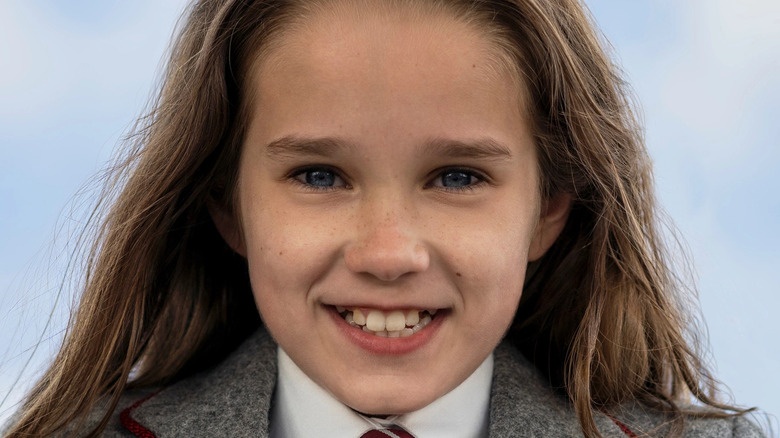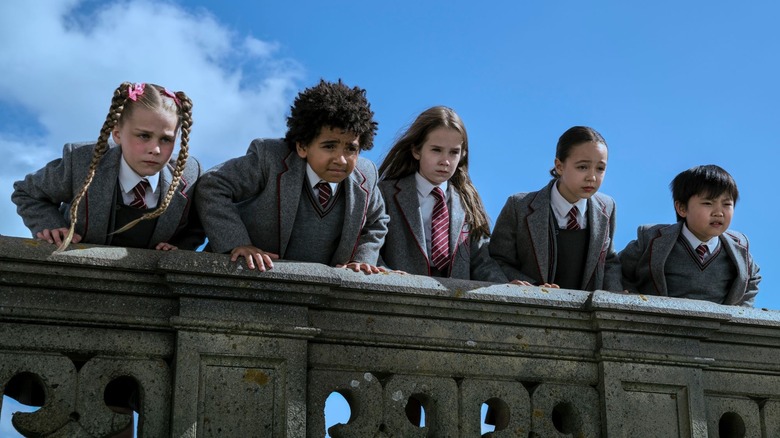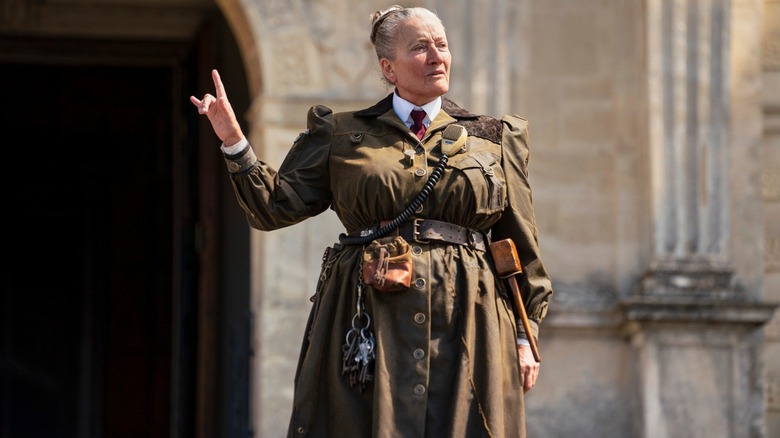Matilda The Musical Review: A Sickly Sweet Twist On The Classic
- Not all of the supporting cast are insufferable -- Stephen Graham is quite fun!
- Removes the darkness of Dahl's work in favor of over-sentimentality
- Child and adult actors alike are uniformly irritating
- There are only two memorable musical numbers, and that's at a stretch
The works of Roald Dahl are many things, but saccharine isn't one of them. During his lifetime, he became best known for his fantastical children's stories, whose inner darkness didn't deter them from becoming beloved by millions of young readers worldwide. In them, the children and animals are constantly threatened with deadly punishments by uncaring adults, with everything from a mystical chocolate factory to a gigantic peach home to things far more threatening than what immediately meets the eye.
"Matilda," originally published in 1988 (and the penultimate novel published in Dahl's lifetime), is a coming-of-age story that lays its darkness bare from the opening pages. The tale of a young girl routinely ignored by her own family, who comes into conflict with an elementary school principal who sees her job as torturing her pupils into unthinking obedience, has like most of Dahl's work remained an enduring cultural phenomenon for generations. Thanks in part to the more gruesome aspects of the story, "Matilda" became engrained in the culture and has become a staple of children's bookshelves amongst the tamer, more conventionally family-friendly literature.
Lacks the bite of Roald Dahl's material
In 2010, "Matilda" made its way to London's West End stage via a musical adaptation which too became a smashing success, eventually winning several Tonys upon its Broadway debut a few years later. A screen adaptation of that stage production was inevitable, and after initially entering development in 2013, it is finally gracing our screens nearly a decade later — only to disappointingly reveal that much of the story's inherent darkness has been considerably watered down into something overly sweet and sentimental. It's the cinematic Roald Dahl adaptation furthest from the mischievous, macabre spirit of his work.
Unlike the previous screen adaptation of "Matilda" — more on that later — "Matilda the Musical," which screened at London Film Festival, relocates the story back to Dahl's original setting: a quaint, middle-class English town. But the spirit of Dahl's source material hasn't been captured along with it, even as it follows all of the plot beats that you remember. An introductory number introduces the Wormwoods (Stephen Graham and Andrea Riseborough, respectively the best and worst performers in the supporting ensemble of adult character actors) as millions of readers have come to know them, parents who didn't want a child, routinely forget she exists, and keep her in their lives somewhat reluctantly.
So far, so Dahl. Upon discovering that she's never been sent to school, Matilda is enrolled into a local elementary overseen by the tyrannical Miss Trunchbull (Emma Thompson, insufferable), a principal who cares less for teaching and more for ensuring children are raised with the terror of authority. When Matilda's teacher Miss Honey (Lashana Lynch) discovers that the new pupil is a self-taught genius through years of reading whilst left to her own devices at home, she aims to intervene and get her to learn with the older children — something which puts Matilda on Miss Trunchbull's radar, due to her distrust of naturally intelligent kids. In short, the story plays out exactly as we've accustomed to, but with bonus song-and-dance numbers in between children with pigtails being flung over the fence like a javelin, and others being forced to eat an entire chocolate cake in one sitting.
Will just make you want to rewatch Danny DeVito's Matilda instead
But while the broad strokes of the narrative feel as familiar to anybody who grew up with the book or director Danny DeVito's 1996 adaptation, the harder edges that made the story so effective in its previous iterations have been curiously sanded off. In the U.S.-set '90s effort, we're introduced to "the chokey" (a box filled with rusty nails badly behaved kids are forced to stay inside) in its full horrific form, with no concessions to how horrifying young children seeing the film would find it. Now, with the book arguably an even bigger staple in pop culture than it was back then thanks to that film's enduring cult success, it remains a strange creative decision to tone down the inherent terror in that conceit. The chokey is introduced but never made into a tangible threat, at one point even turning it into an elaborate punchline at the end of an "I Am Spartacus" mimicking sequence. It's just one symptom of a much larger problem the film struggles with, aiming to rush into the emotional catharsis of Matilda finding her chosen family and never lingering on the truly macabre experiences in the school that help the eventual pay-off land so effectively.
The tonal shift from the source material to something much more overly sentimental can also be found elsewhere. Held in high regard as one of the best numbers in the stage production, "When I Grow Up" might be the most jarring inclusion on the soundtrack, a sharp-left turn into melancholy, as the schoolchildren all sing about their future hopes and dreams when they finish school — it's the kind of overbearing sweetness that you wouldn't find in Dahl's writing anywhere outside of Willy Wonka's factory. At the very least, it does prove to be one of the only memorable songs within the musical, with only one song ("Revolting Children," used extensively in the promotional materials) satisfying as both an effectively staged number within the context of the film, and as a great song outside of it. It should come as no surprise that director Matthew Warchus, who also directed the original West End production, leaves that until five minutes before the end credits roll, a reminder of what makes an effective musical sequence to leave you on a temporary high after a near-two-hour drought.
As a filmmaker, Warchus is something of a workmanlike figure, known for taking darker subject matter and making something broadly uplifting out of it (his previous effort, 2014's "Pride," was a considerably more effective example of this). There is nothing as distinctive in this film as there was in DeVito's take, which perfectly matched his directorial sensibility for finding the broad humor within the pitch-black and lightly surreal — it'll remain a childhood staple for generations to come. "Matilda the Musical," on the other hand, will likely get lost to the Netflix algorithm within days as families will likely opt to watch that previous adaptation instead.
Nevertheless, "Matilda the Musical" arrives in select theaters on Friday, December 9 and premieres on Netflix on December 25.


